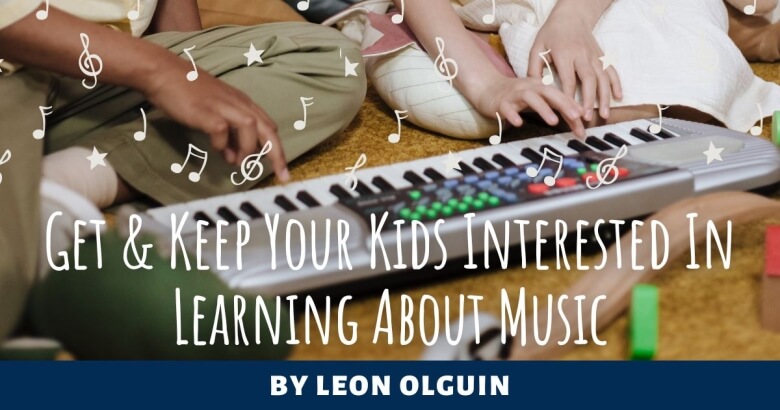By Leon Olguin, At Home With Music
Getting your children interested in learning about music can be an exciting and rewarding experience, but it can also be a challenge.
Music today is often seen as a consumable, produced by people in the “music business,” and designed to be as attractive as possible to the music buying public. (It used to be the “record buying public,”) but times have changed!
Now it’s largely the “music streaming public.” To actually learn about music, how it works, how anyone can make music and learn to truly appreciate it, takes some effort on the part of both the teacher and the student, but will result in a richer, fuller life.
How can you get your children interested in learning about music?
How can you keep them interested when there are so many distractions out there?
First of all, be sure to introduce your children to a variety of music genres. Let them hear some classical music, jazz, pop, rock, world music (not an exhaustive list!). When introducing them to classical music, make sure to start with shorter pieces, perhaps some that are well known. There are countless videos available on YouTube and other streaming services that feature all types of music.
Create a musical environment in your home.
Play music regularly. You can find age-appropriate songs for every stage of your child's life. Encourage your children to listen to music actively, rather than using it as background noise.
Listen along with them.
Ask them what they think about the music you are listening to together. How did the music make them feel? What images came to their minds as they heard the music?
If you're listening to a popular song together, encourage your children to sing along or to even dance to the music. Be sure to sing and dance with them!
Provide your children with musical instruments like keyboards, guitars, recorders, or percussion instruments.
Give them the opportunity to create and explore.
Find out what their musical interests are. It could be piano, guitar, violin, or singing (again, not an exhaustive list!). Enroll your children in music lessons based on their interests.
I encourage all music students to start with learning the basics of the keyboard (which is not as difficult as you might think) and then include other instruments in which they may be interested.
Find a knowledgeable and patient teacher who will work hard to get to know your child and teach them the fundamentals of music.
Look for a teacher who will seek to understand your child and inspire them to learn.
You may end up teaching the basics of music yourself (once again, not as difficult as you might think, even if you don’t consider yourself a musician).
I’ve been a professional musician since I was in my early teens, and I have been very fortunate when it comes to the teachers under whom I have studied.
I started taking piano lessons at age 12. My first piano teacher was very kind and very patient, and she also made the effort to understand me. She saw that I was interested in more than just reproducing the notes on a page.
She realized early on that I wanted to be creative, I wanted to compose. So, she sent me to another teacher who specialized in teaching composition. She also saw that I wanted to develop my technique, as I wanted to learn to play more difficult music, so she sent me to a third teacher.
All the while, I continued taking lessons from her well into my high school years.
Teaching is a talent just as much as the ability to play an instrument. Having a bad or mediocre teacher can drive the joy out of anything. Having a great teacher can be life changing.
Your child needs someone who not only can teach them skills, but who also inspires them. They need someone who is going to challenge them.
The worst thing a teacher can do is only give them things they’re comfortable with, or things below their potential.
Find a teacher who will encourage musical experimentation, let your children explore and create their own tunes. Yes, they need to do their lessons as assigned by their teacher, but they also need the freedom to explore to try things out. You never know what they will come up with!
Take them to see live performances.
I'm not talking about giant event concerts with big stars. After all, that can be pretty expensive! Take them to recitals or musical events in your community.
You may have to do some research, but in every community, there is always something going on in the local music scene. There's nothing more inspiring and captivating than experiencing the magic of live music, especially when the performers are accessible, and available to talk to after their concert.
Give your children the opportunity to meet actual musicians.
Encourage your children to participate in a choir, orchestra, or band. Working together with other kids toward a common musical goal can foster teamwork and a sense of accomplishment.
In my own experience, I grew the most as a musician when I played as part of an ensemble or sang in a choir.
Introduce your children to the lives of famous composers, musicians, and bands. There are countless books and documentaries available that can inspire their curiosity and appreciation for all things music.
Remember that patience and a supportive attitude are key when introducing your children to the wide world of music.
Let them explore and discover their own musical preferences, and be open and appreciative of their unique expressions of creativity.
By Leon Olguin from At Home With Music | Free Music Lessons
Read More!
- Log in to post comments

